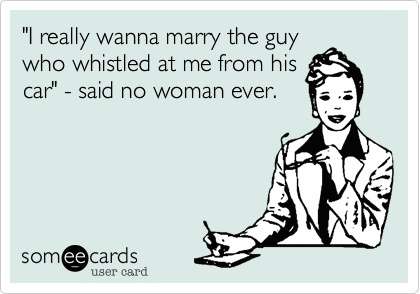Elaine Crory, Belfast, Northern Ireland, SSH Blog Correspondent
 Often in discussions about how to tackle street harassment, there are suggestions that it should be a criminal offense, perhaps even a hate crime. And in response, inevitably far too many men clamour to defend the practice and share collective horror at the idea that mere words should be a crime, that they should be restricted in this way because of “snowflake” women, taking offense to a bit of banter.
Often in discussions about how to tackle street harassment, there are suggestions that it should be a criminal offense, perhaps even a hate crime. And in response, inevitably far too many men clamour to defend the practice and share collective horror at the idea that mere words should be a crime, that they should be restricted in this way because of “snowflake” women, taking offense to a bit of banter.
That’s disingenuous though, and I think men know it. Street harassment, the verbal kind consisting of catcalling or comments on appearance, are not genuinely motivated by a desire to get to know the woman. They are about social status and control.
“All the world’s a stage”, Shakespeare once wrote, “and all the men and women merely players”. When we’re young and finding our way in the world, it certainly can feel as though we are trapped in roles, reading lines we have not written for ourselves, particularly where gender roles are concerned. For young men under patriarchy, this often consists of vigorously demonstrating their red-blooded, usually heterosexual, manliness; a performance of manhood, as much for the benefit of their male peers as for any young women. Gender theorists have argued for decades that gender is performative, and never is it more obvious that in adolescence. So, some young men find themselves catcalling women, laughing along with the dubious behaviour of the ‘alpha’ of their group as he skirts acceptable behaviour, playing a role for all he’s worth. With time and self-awareness many young men grow out of this and distance themselves from that kind of black and white thinking. Many, however, do not.
These are the men clogging newspaper comments sections with fury when catcalling is called out for what it is. They are the ones who use alcohol as an excuse to get a little too loose with words and sometimes with their hands on a boy’s night out. They are the ones who defend “locker room” talk and the behaviour it implies as “alpha male boasting”. They know that it’s about social control, but they will not admit it. They don’t expect women to turn and swoon as they tell sexual obscenities from doorways and moving cars. A recent viral video, where a woman pretends to take a man up on his sleazy offer, shows this amply. That’s not what they want, anyway. They want women to look down and scurry away, feeling ashamed and self-conscious. Or to shout angrily, maybe even with tears in her eyes; to feel violated and exposed.
They want you to know that your appearance in public makes you their property and that they are the real owners of the streets, you are allowed there on their terms only.
It’s not a compliment, and they know it, including because they don’t only dole out “positive” comments. My own very first experience of street harassment taught me that. I was only thirteen and already bowed by self-consciousness. I carried myself as though to shrink through a crack in the pavement. I was crossing the main square in my small town when I found myself in the path of three young men, probably a decade older than me, and much taller and larger. One of them deliberately put himself in my path and dodged further into my way when I tried to walk around him. He leaned down and made a show of looking me up and down. “F*ck, you’re ugly”. He spat the words out. I scurried away. I wasn’t angry or defensive. I believed him. There’s that role playing again.
It took many years before I saw this for what it is, and many conversations with people who had had other abuse of that kind thrown their way while navigating the public sphere, including racial abuse, being called fat, homophobia and transphobia, even abuse on the basis of belonging to a visible subculture like goth or punk. I get it now; these men think they own public space, and we must meet their aesthetic standards in order to take up space there. Our job as activists against street harassment is to show them how wrong they are.
Elaine is a part-time politics lecturer and a mother of two. She is director of Hollaback! Belfast, co-organises the city’s annual Reclaim the Night march, and volunteers with Belfast Feminist Network and Alliance for Choice to campaign for a broad range of women’s issues.
